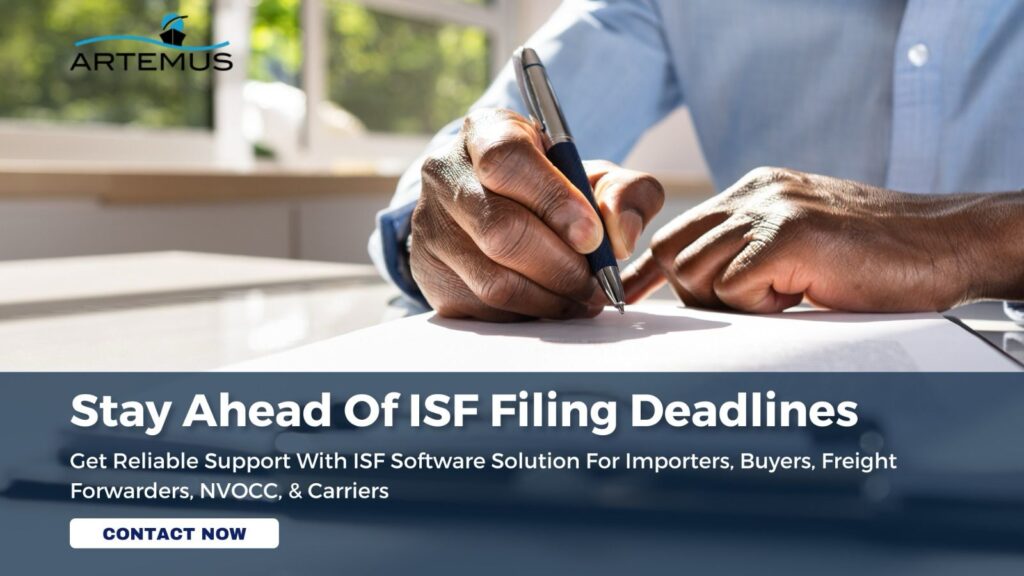
What Is Inbound Logistics & Outbound Logistics? A 2025 Guide
In the dynamic world of supply chain management, understanding the nuances of inbound and outbound logistics is crucial for operational

Interested in pursuing a career as a freight broker but unsure about the associated costs? Look no further! From licensing fees to technology investments, navigating the financial landscape can be complex.
However, with the assistance of industry-leading tools like Artemus Transportation Solutions‘ Freight Forwarder Software for ISF & AMS filings, you can streamline operations and boost efficiency.
Join us as we explore the intricacies of the financial aspects of freight brokerage and discover how to effectively manage them with Artemus at your service.
Table Of Contents
Becoming a freight broker involves several costs that aspiring professionals need to consider before entering the industry. Understanding these costs is crucial for planning and budgeting effectively.
Here’s a detailed breakdown of the expenses involved in becoming a freight broker:
Before becoming a licensed freight broker, individuals often undergo training to learn about the industry’s regulations, practices, and software systems. Training programs can range from online courses to in-person seminars, with costs varying based on the provider and depth of the curriculum.
Obtaining a freight broker license is a prerequisite for legally operating in the industry. The cost of the license application varies depending on the regulatory authority overseeing freight brokerage in your jurisdiction. Typically, applicants can expect to pay several hundred to over a thousand dollars to obtain their freight broker license.
The licensing fee varies depending on the type of license sought and the specific requirements outlined by the FMCSA. This fee covers administrative costs associated with processing the application, conducting background checks on applicants, and maintaining regulatory oversight of licensed brokers.
Freight brokers are required to obtain a surety bond as part of their licensing process. This bond provides financial security for both shippers and carriers in the event of the broker’s failure to meet contractual obligations. The cost of a surety bond is typically a percentage of the bond amount, which can range from $75,000 to $100,000 depending on regulatory requirements.
Liability insurance is essential for protecting freight brokers against potential legal claims arising from their business activities. The cost of insurance premiums varies based on factors such as coverage limits, deductibles, and the broker’s operating history.
Many freight brokers choose to operate as a business entity, such as a corporation or limited liability company (LLC), for liability protection and tax purposes. The cost of incorporating or forming an LLC includes state filing fees and may also involve legal fees if assistance is sought from an attorney.
Here’s a breakdown of the approximate costs for each structure:
LLC (Limited Liability Company):
Corporation:
Sole Proprietorship:
While some freight brokers operate from home offices, others may choose to rent commercial space to accommodate their operations. Additionally, brokers need essential office equipment such as computers, phones, and internet access, which contribute to their overhead costs.
Freight brokers rely on specialized software to manage their operations efficiently. This includes software for load tracking, dispatching, accounting, and compliance with regulatory requirements. The cost of transportation software can vary depending on the features and scalability of the solution.
Building a client base and establishing a reputation in the industry requires investment in marketing and advertising efforts. This may include expenses related to website development, advertising campaigns, networking events, and industry memberships.
Staying updated on industry regulations and best practices is essential for success as a freight broker. Continuing education programs, industry conferences, and compliance resources incur costs but are necessary for maintaining licensure and staying competitive.
Additional costs associated with running a freight brokerage business include professional fees (e.g., legal and accounting services), office supplies, travel expenses, and contingency funds for unforeseen circumstances.
In summary, the total cost of becoming a freight broker can vary widely depending on individual circumstances and business preferences. By carefully assessing and budgeting for these expenses, aspiring freight brokers can set themselves up for success in this dynamic and rewarding industry.
Related: How To Get A Freight Broker License?
Looking to effectively manage the costs associated with being a freight broker? Here are five pointers to help you stay on top of your finances and maximize profitability:
Develop a detailed budget that accounts for all your expenses, including licensing fees, insurance premiums, technology subscriptions, and marketing costs. Continuously review and adapt your budget to maintain financial stability.
Research and compare different options for essential services like insurance, software, and office space to find the most cost-effective solutions without sacrificing quality or reliability.
Don’t hesitate to negotiate with service providers, such as insurance companies or software vendors, to secure better rates or discounts. Building long-term relationships and demonstrating loyalty can often lead to favorable terms.
Invest in efficient and user-friendly freight brokerage software, like Artemus, to streamline operations and minimize administrative costs. Take advantage of features such as automated invoicing and load tracking to increase productivity and reduce manual labor.
Regularly evaluate your business processes and identify areas where you can optimize efficiency and reduce costs. Whether it’s implementing new technologies or refining your marketing strategies, prioritize continuous improvement to stay competitive in the market.
Related: How To Become A Freight Broker With No Experience?

Artemus Transportation Solutions provides a comprehensive software solution tailored specifically for freight forwarders, streamlining their operations and enhancing compliance with Importer Security Filing (ISF) and Automated Manifest System (AMS) filings.
Here’s how Artemus Transportation Solutions stands out in the industry:
Related: What Is Freight Forwarder Vs Broker: 6 Key Differences
Most freight brokers typically charge a commission ranging from 10% to 35% of the total transportation cost.
To start as a freight broker, you need to obtain a license, secure a surety bond, and build relationships with shippers and carriers.
Most freight brokers typically charge a commission ranging from 10% to 35% of the total transportation cost.

Venturing into the world of freight brokerage offers exciting opportunities for those willing to navigate its challenges. Understanding the costs involved in becoming a freight broker is essential for aspiring professionals to plan effectively and make informed decisions.
From licensing fees to insurance, training, and software expenses, each cost plays a crucial role in establishing and sustaining a successful brokerage business.
Related: What Is A Freight Broker & How Do They Work In 2024?

In the dynamic world of supply chain management, understanding the nuances of inbound and outbound logistics is crucial for operational

In today’s interconnected world, businesses rely heavily on global trade to expand their markets, access new resources, and drive growth.

Importing goods for resale in the USA presents a lucrative business opportunity, but navigating the complexities of U.S. customs regulations,
Get In Touch
Artemus’ Software Solutions for ISF, AMS, Japan AFR, eManifest Canada, & Panama B2B filings.